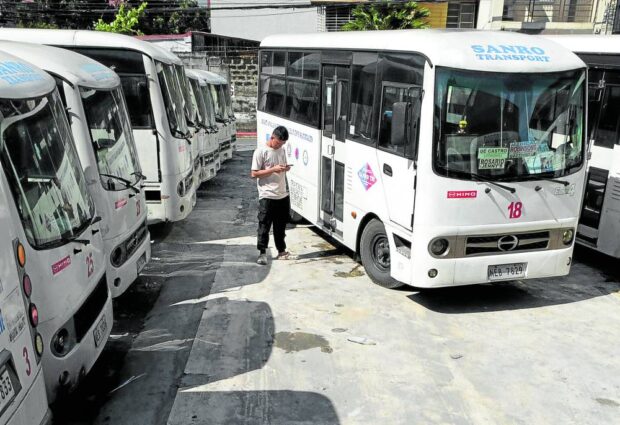
NEW ROAD KINGS Modern jeepneys are parked at a terminal in San Juan City as the House committee on transportation prepares to look into alleged irregularities in the implementation of the government’s public utility vehicle modernization program. —GRIG C. MONTEGRANDE
MANILA, Philippines — Recognizing the adverse effect of the government’s public utility vehicle modernization program (PUVMP) on the livelihood of some jeepney drivers and operators, the Technical Education and Skills Development Authority (Tesda) on Monday urged them to avail themselves of its “Tsuper Iskolar Scholarship Program.”
Launched in 2019 in partnership with the Department of Transportation (DOTr), the initiative aims to provide free training on technical-vocational skills as well as entrepreneurship, assessment, and certification to PUV drivers, operators, and family members who were “displaced or otherwise affected” by the modernization program.
New stakeholders in the transport industry and family members/dependents of the affected stakeholders up to the third degree of consanguinity or affinity may also apply for the scholarship, according to Tesda.
Under the agency’s Circular No. 20 issued in 2019, beneficiaries would be entitled to a P350 daily training fund for up to 35 days to cover their food and transportation allowance. A P300-million fund was transferred to Tesda last year for the scholarship program. Ibon defends projection
Progressive think tank Ibon Foundation, meanwhile, stood by its projections that minimum fares for jeepneys would go up to around P45 to P50 by 2028, as it challenged the DOTr to admit that there would be fare hikes should it push through with the PUVMP.
In an open letter to the DOTr, Ibon executive director Sonny Africa observed that it was “conspicuous they’re (DOTr) not saying that fares won’t increase upon modernization, because they know that fares will rise.”
Transportation Secretary Jaime Bautista earlier dismissed the think tank’s estimate for a possible 284-percent increase in minimum jeepney fares in the next five years, saying there was no basis for this.
Africa, however, said the projection was based on “simulations of the cost per jeepney passenger under modernization.”
An internal computation by Ibon that was shown to the Inquirer showed that it took into consideration the projected costs of jeepneys (between P2 million and P4 million), more expensive repairs, as well as additional expenses for the required garage facilities and organizing consolidated fleets.
Ibon’s computation was somewhat similar to a 2021 study made by Teodoro Mendoza of the University of the Philippines-Center for Integrated Development Studies which computed the minimum fares needed to cover monthly amortizations for a modern jeepney.
Mendoza estimated that to cover a P2.5-million jeepney unit compliant with the PUVMP, drivers would have to earn as much as P6,899 daily to offset the total costs.
If that jeepney is able to ferry just 200 passengers a day (below the ideal 400 passengers daily), fares could go up to around P34.45 to P36.40 to cover the costs, the report added. Ibon’s computations make the same assumptions, though it assumes a slightly higher fare increase. INQ